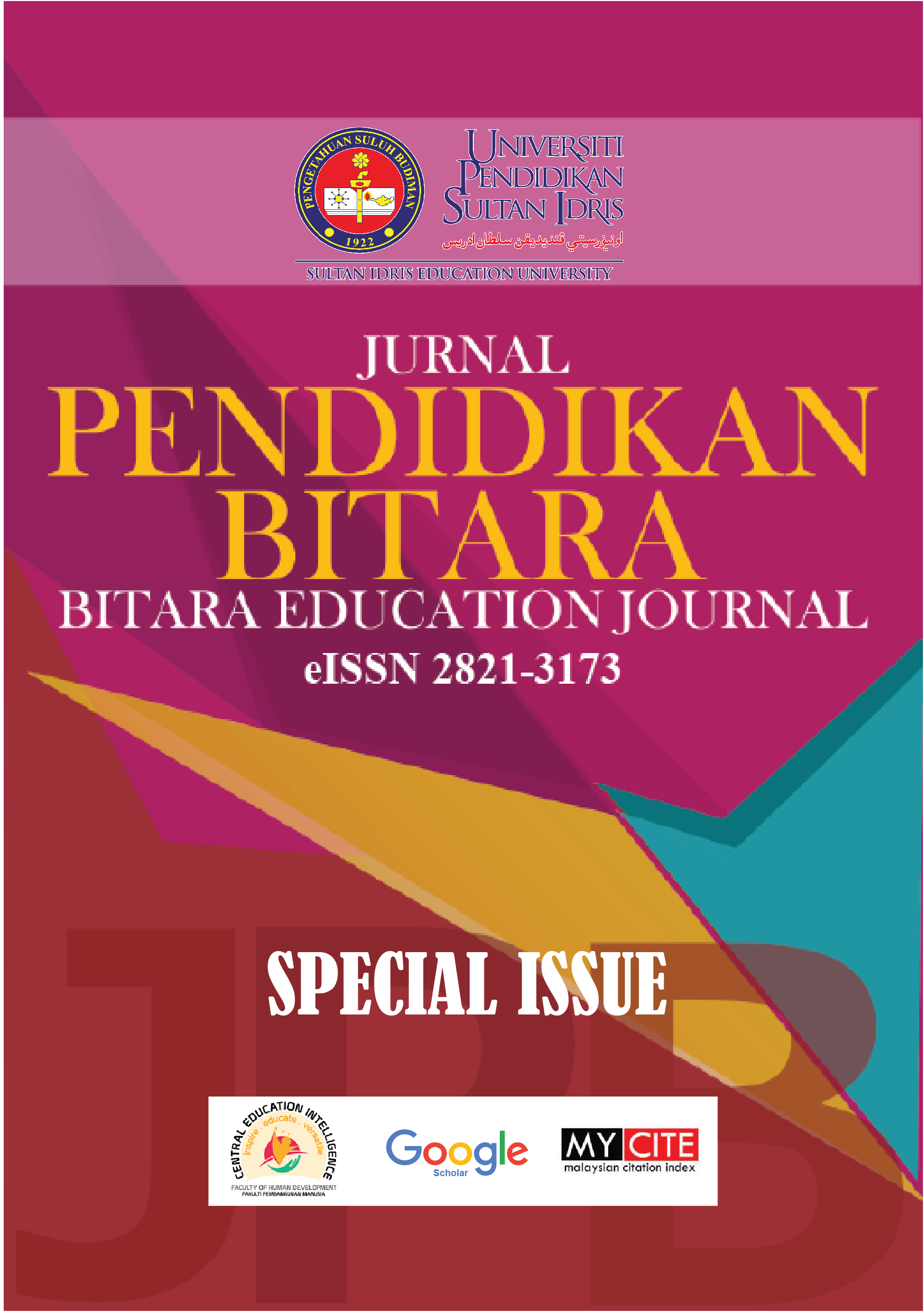Pengetahuan dan Kemahiran Teknologi Guru Pelatih abad ke 21
DOI:
https://doi.org/10.37134/bitara.vol17.sp2.11.2024%20Keywords:
Guru pelatih, teknologi, UTAUT, ESLAbstract
Kemahiran dan pengetahuan teknologi merupakan salah satu elemen utama yang perlu dilengkapkan dalam program latihan guru untuk memastikan generasi guru masa hadapan mampu menghadapi perubahan digital dalam landskap pendidikan. Kajian ini bertujuan untuk mengetahui pengalaman guru pelatih ESL (English as a Second Language) dalam menggunakan kemahiran teknologi mereka semasa fasa latihan mengajar n dan mengetahui sebarang cabaran yang dihadapi oleh guru pelatih. Menggunakan teori Unified Theory of Acceptance and Use of Technology (UTAUT) sebagai rangka kerja penilaian, data dikumpul melalui pemerhatian, temu bual dan analisis dokumen. Dapatan kajian menunjukkan bahawa kebanyakan peserta tidak dapat menggunakan teknologi dalam penyampaian pelajaran mereka, walaupun mereka mempunyai tahap pengetahuan tinggi dalam menggunakan aplikasi teknologi. Kajian ini mengenal pasti beberapa faktor seperti kekurangan kemudahan integrasi teknologi di sekolah dan kekurangan aspek penilaian terhadap elemen teknologi. Keputusan kajian ini menekankan keperluan untuk strategi kurikulum guru pelatih yang sistematik dan komprehensif serta melibatkan semua pihak berkepentingan untuk memudahkan peralihan yang lancar bagi guru pelatih ESL daripada latihan kepada lapangan dan memastikan penggunaan teknologi diperkukuh di semua peringkat.
Downloads
References
Alférez-Pastor, M., Collado-Soler, R., Lérida-Ayala, V., Manzano-León, A., Aguilar-Parra, J. M., & Trigueros, R. (2023). Training digital competencies in future primary school teachers: A systematic review. Education Sciences, 13(5), 461. https://doi.org/10.3390/educsci13050461
Gavinolla, M., Livina,A. & Swain,S.(2022).State of the Research on Teacher Education and Sustainability: A Bibliometrics Analysis. Journal of Teacher Education for Sustainability,24(2) 147-165. https://doi.org/10.2478/jtes-2022-0022
Grassinger, R., Bernhard, G., Müller, W., Schnebel, S., Stratmann, J., Weitzel, H., Aumann, A., Gaidetzka, M., Günther, V., Heiberger, L., Mustaca, M., Schmidt, C., & Visotschnig, M. S. (2022). Fostering digital media-related competences of student teachers. SN Computer Science, 3(4). https://doi.org/10.1007/s42979-022-01135-8
Gumennykova, T., Pankovets, V., Liapa, M., Miziuk, V., Gramatyk, N., & Drahiieva, L. (2020). Applying instructional design methods to improve the effectiveness of blended-learning. International Journal of Management, 11(5), 31-42. http://iaeme.com/Home/issue/IJM?Volume=11&Issue=5
Haşlaman, T., Atman Uslu, N., & Mumcu, F. (2023). Development and in-depth investigation of pre-service teachers’ digital competencies based on DigCompEdu: A case study. Quality and Quantity. https://doi.org/10.1007/s11135-023-01674-z
Hidayat, M. L., Hariyatmi, Astuti, D. S., Sumintono, B., Meccawy, M., & Khanzada, T. J. S. (2023). Digital competency mapping dataset of pre-service teachers in Indonesia. Data in Brief, 49. https://doi.org/10.1016/j.dib.2023.109310
McGarr, O., & McDonagh, A. (2021). Exploring the digital competence of pre-service teachers on entry onto an initial teacher education programme in Ireland. Irish Educational Studies, 40(1), 115–128. https://doi.org/10.1080/03323315.2020.1800501
Muammar, S., Hashim, K. F. B., & Panthakkan, A. (2023). Evaluation of digital competence level among educators in UAE higher education institutions using Digital Competence of Educators (DigComEdu) framework. Education and Information Technologies, 28(3), 2485–2508. https://doi.org/10.1007/s10639-022-11296-x
Niyazova, A. Y., Chistyakov, A. A., Volosova, N. Y., Krokhina, J. A., Sokolova, N. L., & Chirkina, S. E. (2023). Evaluation of pre-service teachers’ digital skills and ICT competencies in context of the demands of the 21st century. Online Journal of Communication and Media Technologies, 13(3). https://doi.org/10.30935/ojcmt/13355
Ong, Q. K. L., & Annamalai, N. (2023). Technological pedagogical content knowledge for twenty-first century learning skills: The game changer for teachers of industrial revolution 5.0. Education and Information Technologies. https://doi.org/10.1007/s10639-023-11852-z
Tomczyk, Ł., Fedeli, L., Włoch, A., Limone, P., Frania, M., Guarini, P., Szyszka, M., Mascia, M. L., & Falkowska, J. (2023). Digital competences of pre-service teachers in Italy and Poland. Technology, Knowledge and Learning, 28(2), 651-681. https://doi.org/10.1007/s10758-022-09626-6
Venkatesh, V., Morris, M., Davis, G. B., & Davis, F. D. (2003), User acceptance of Information Technology: Toward a unified view, MIS Quarterly, 27(3), 425–478.
Yoon, S. H. (2022). Gender and digital competence: Analysis of pre-service teachers’ educational needs and its implications. International Journal of Educational Research, 114. https://doi.org/10.1016/j.ijer.2022.101989
Zhang, C., Schießl, J., Plößl, L., & Siebert, M. (2023). Acceptance of artificial intelligence among pre-service teachers: A multigroup analysis. International Journal of Educational Technology in Higher Education, 20(49), 1-16. https://doi.org/10.1186/s41239-023-00420-7
Downloads
Published
How to Cite
Issue
Section
License
Copyright (c) 2024 Muhamad Hakim Azman, Mohd Nazir Md Zabit, Puteri Zarina Megat Khalis, Siti Almunawwarah Shahuddin, Muhammad Fitri Ahmad, Tirzah Zubeidah Zachariah

This work is licensed under a Creative Commons Attribution-NonCommercial-ShareAlike 4.0 International License.





